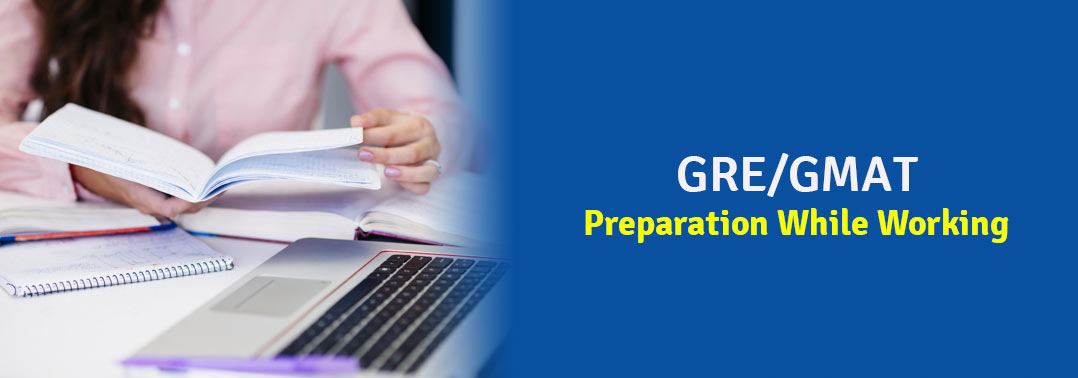As a working professional wanting to crack GRE/GMAT to pursue an MBA, your learning process transcends beyond the exam curriculum. It also becomes a journey of self-discovery: understanding your level of determination and capability to excel under pressure. The reason being, you have an additional challenge in hand: How to balance your preparation while continuing your job?
The answer often springs a dilemma of “Should I quit my job to prepare for GRE/GMAT, or manage both simultaneously?’
If this rings a bell, then be rest assured, you are not alone. A considerable percentage of the GRE/GMAT aspirants are working professionals between the age of 23 and 40. And many of them have managed to crack the 700 marks barrier to get admission in some of the top B-schools in India and abroad! Plus, having work experience adds weight to your profile.
So, successfully attempting the GRE/GMAT, while having a full-time job, is a daunting task — not an impossible one. Now, let us find out how to set your dream flight on course to your destination.
Check the Ground Reality
One of the biggest advantages of both GRE and GMAT is that they do not have any age restriction for applicants. So, it is never too late for an aspirant! However, you have to be realistic about your mental readiness and physical adaptability to take on the grueling preparation schedule. But don’t beat yourself up over it, because everyone has limitations.
The important thing is to understand your present position (in terms of preparation level), identify your weak points, and develop a study plan accordingly. Taking a diagnostic test is a good start. The results will help you calculate the time, speed, and distance you need to reach your goal.
Set your Destination
While planning your destination — preferred B-Schools — set your target score first. Visit the websites of those institutes; and check their average cut-off score for admission in the last few years. This will give you an idea about the scores you would need, which should ideally be 20–30 points above the average.
Plan a Flight Path
Next, search for a training program that suits your daily schedule. Many classroom training programs have sessions designed especially for working professionals, offering classes once (or twice) a week, or even only on weekends. Also, there are several online courses that allow the flexibility to study from anywhere, at any time.
Just make sure you have experts to help you understand how much you need to improve, and in which sections.
Schedule an Early Take-off
Time is a luxury for every working professional trying to squeeze in that extra 2-3 study hours after a hectic workday. The key is to master time management in two forms: micro and macro.
The micro schedule is where you have to calculate every available hour and minutes within a 24-hour timeframe; and utilize them optimally. Let’s say, like most working professionals, you have to work around 40+ hours, five days a week, which is 8–9 hours/day. After accounting for work, commute, and sleep, you can study for up to two hours on working days. On weekends, however, you can study for 4–5 hours a day. This amounts to a preparation time of 18-20 hours per week; and leads to the concept of time management at the macro level.
The macro form gives you an idea about the length of the runway you need to cover to ensure a smooth take-off for GRE/GMAT. Considering you have a full-time job, you are time-starved as compared to a student who can dedicate 6-7 hours per day for studies and preparation. So, logically if a student needs 3-6 months of preparation time for the scheduled GRE/GMAT, you would take longer. To compensate, you need to start preparing early.
Be Consistent to Maintain Altitude
Assuming, you have enrolled in a course and developed a study schedule for GRE/GMAT, take a look at this scenario: In the first week, you hit the target of 20 hours/week study plan. In the next week, the hours dwindle a bit because there was deadline pressures at work; and by the third and fourth weeks, the study schedule goes for a toss due to, maybe, a sick day, vacation time, and in trying to catch up with the previous missed lessons.
In such cases, consistency is the key to maintain a balance between a stringent schedule and unforeseen events that can disrupt it. Although you have a customized study plan charted out, always be on the look out to squeeze in some extra study time during travel, coffee breaks, or whenever you have a spare 5–10 minutes. Cut out distractions like social media and binge-watching for these few months to remain absolutely focused.
Surrounding yourself with like-minded people is a great way to stay motivated. Try to get in touch with those, who are experiencing the same predicament, through a study group or an online forum. This way, your preparations will become a social activity; and you will be able to remain positive while following, sharing, and reading others’ experiences.
So, hold on tightly through those moments of despair, keep the bigger picture in mind, and hit the ground running on D-day!.
Shoma Banerjee
Guest Author





















































